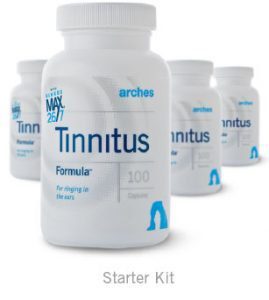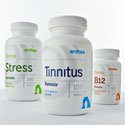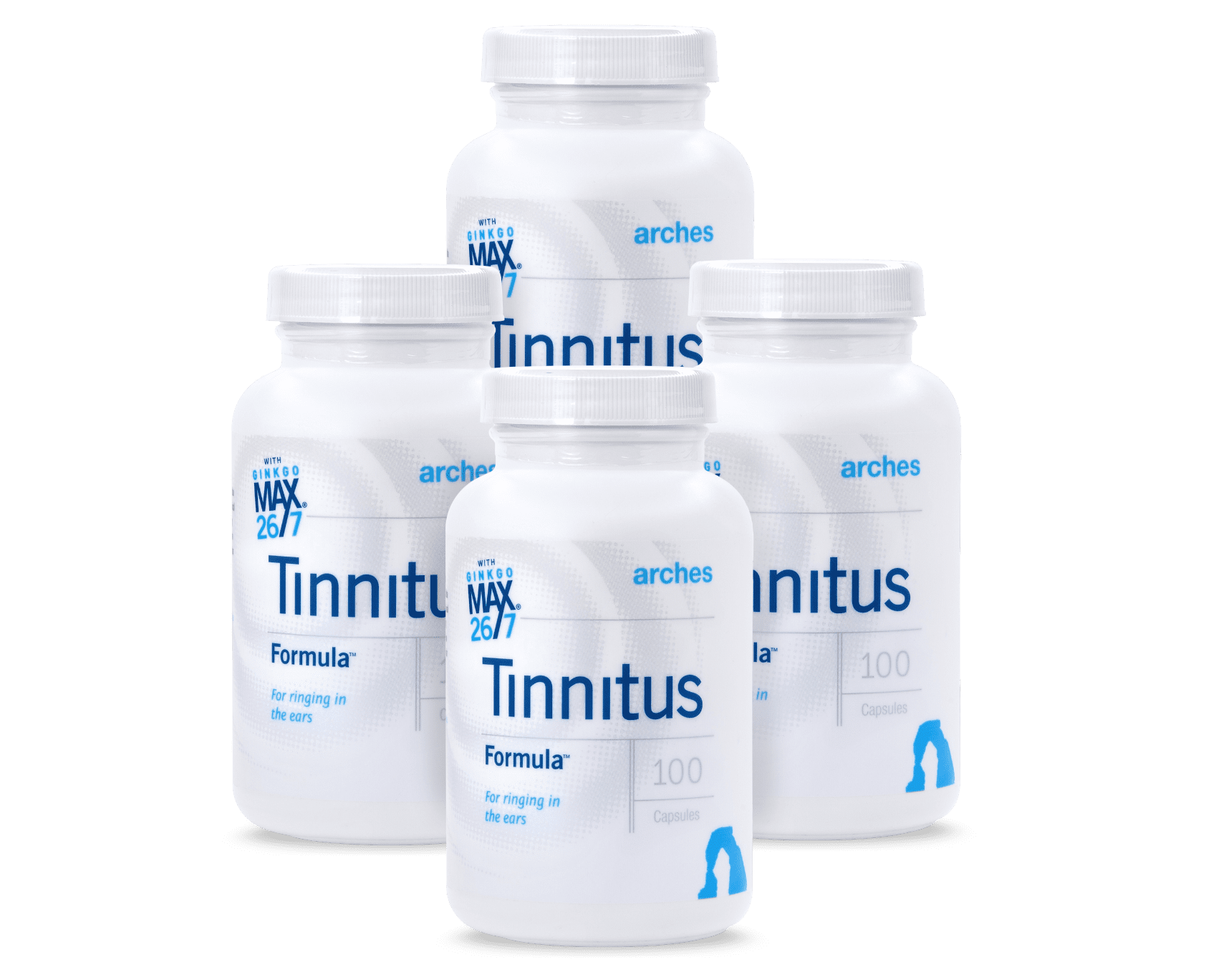By Barry Keate
Barry Keate, has lived with tinnitus over 40 years and has published 150+ research articles on numerous aspects of tinnitus. He is an expert on the condition and a well-known advocate for those with tinnitus.
Readers of our Quiet Times newsletter are aware, Arches Tinnitus Formulas also publishes a monthly help column, “Ask Barry,” where individuals can ask questions about tinnitus. As you’d expect, many of the questions are on common themes. Here we’ll address two of the more common Ask Barry topics, and we’ll discuss others in the next two months’ newsletters.
This month’s topics are ototoxic medications and which of our products is the most important for reducing tinnitus.
1 – Tinnitus from Ototoxic Medications
Much of the information here comes from the Vestibular Disorders Society. (1)
Ototoxic medications are toxic to the ear (“oto” means ear). They can damage the hearing and balance portions of the vestibular-cochlear system. (The vestibular system controls balance and movement, while the cochlear systems controls hearing.) Because the inner ear is responsible for both hearing and balance, ototoxicity can result in disturbances of either or both of these systems.
The occurrence and degree of ototoxicity depends on the drug involved and other factors, such as combining two ototoxic medications, heredity, and kidney insufficiency. Some drugs cause temporary disturbances, which will resolve after use is discontinued. Other drugs can do permanent damage to the ear. Most people who experience ototoxicity have a temporary or reversible form that does not involve a major or long-term disruption in their lives.

The first symptoms to appear are usually tinnitus and sometimes vertigo. Hearing loss and more severe vestibular disturbances can follow.
Unfortunately, the Food and Drug Administration (FDA) does not require testing of effects on inner ear function before a drug is released to the marketplace. Many drugs have been discovered to be ototoxic only after a long period of widespread use. This was the case with aspirin and quinine a century ago, with streptomycin in the 1940s, and with anti-cancer drugs more recently.
This lack of oversight makes it impossible to say with certainty how many drugs on the market can cause vestibular or cochlear damage, but it is certainly in the hundreds. The American Tinnitus Association has published a list of ototoxic medications, but it was last updated in 2006, so many newer drugs with ototoxic effects are not included.
When I’m asked about a specific medication, I do a Google search for “(name of drug) side effects.” I often end up at drugs.com, which is very thorough in reporting side effects. It will generally list whether or not the drug is known to be ototoxic and how often this effect occurs.
To find what I’m seeking quickly, when I’m on such a page, I search the page itself for “tinnitus” and “ringing.” (Control-F on a PC, or Command-F on a Mac.)
Several broad categories of drugs are potentially ototoxic. These include aspirin and quinine, non-steroidal anti-inflammatory drugs (NSAIDs), loop diuretics, some antibiotics, SSRI anti-depressants, and medicines used to treat cancer. Many environmental chemicals and metals can have similar effects.
Aspirin and Quinine
Aspirin and quinine are well known to cause temporary ototoxicity resulting in tinnitus. In high doses, they may also reduce hearing. Quinine products, which are often used in anti-malaria medications, can also temporarily impede proper balance. Once an affected person stops taking these drugs, hearing and balance usually return to normal.
NSAIDs
Nearly all non-steroidal anti-Inflammatory drugs can cause some degree of ototoxicity, but whether a specific individual will have damaging effects is hard to predict. Two of the more potent NSAIDs are Ibuprofen (Advil) and Naproxen (Aleve). Even a low dose of ibuprofen sends my tinnitus through the roof for several hours.
Discontinuing use of these drugs generally resolves the problem.
Loop Diuretics
Loop diuretics are a family of water pills which used to be prescribed commonly for high blood pressure. They are used less frequently today. These drugs cause tinnitus, which usually disappears when the drug is stopped. Brand names of the common loop diuretics include Bumex, Edecrin, Lasix and Demadex.
High blood pressure is often treated today with Hydrochlorothiazide (HCTZ), which is not a loop diuretic and does not usually cause ototoxicity.
Aminoglycoside Antibiotics
All medications in this family have the potential to cause tinnitus. A higher risk occurs when one of these drugs is combined with another ototoxic medication, or when it is used for longer periods of time. Higher dosages also increase the chance of ototoxicity.
The largest doses are intravenous. Smaller doses are usually taken orally as pills.
The aminoglycoside family includes:
- Amikacin
- Dihydrostreptomycin
- Gentamicin
- Kanamycin
- Neomycin
- Netilmicin
- Streptomycin
- Tobramycin
SSRI Anti-Depressants
I often hear from people who have developed tinnitus by taking prescription anti-depressants. Both the older (tricyclic) and the newer (SSRI) antidepressants can be ototoxic. SSRIs (Selective Serotonin Re-Uptake Inhibitors) increase serotonin in the brain, and excess serotonin in the brain can cause tinnitus, according to a recent study. (2)
Among the tricyclics, Clomipramine and Amitriptyline are among the most frequent offenders. SSRI anti-depressants include: Prozac, Zoloft, Paxil, Celexa and Luvox. Anyone taking one of these drugs should have regular hearing tests and take antioxidants to prevent hearing damage.
Anti-Cancer Drugs
Chemotherapy drugs (such as Cisplatin and Carboplatin) almost always cause permanent hearing loss and tinnitus. Taking high levels of antioxidants will can help to mitigate these effects.
Environmental Chemicals and Metals
Numerous environmental toxins have been implicated in tinnitus, and the effects are often permanent.
- Butyl nitrate
- Carbon disulfide
- Carbon monoxide
- Hexane
- Lead
- Manganese
- Mercury
- Styrene
- Tin
- Toluene
- Trichloroethylene
- Xylene
Arches Tinnitus Formula for Ototoxicity
We developed Arches Tinnitus Formula specifically for those who have tinnitus due to hearing loss, including from ototoxic medications. It provides highly concentrated antioxidants which help protect against further hearing loss. It will also reduce tinnitus in those who already have it.
 Arches Tinnitus Formula includes highly concentrated Ginkgo biloba, trademarked as Ginkgo Max 26/7. This product is the highest-quality, most concentrated ginkgo on the market and is designed to reduce tinnitus sound levels. The full effect may be observed after taking it for three months, so we recommend the Arches Tinnitus Starter Kit, a full three-month supply (four bottles.
Arches Tinnitus Formula includes highly concentrated Ginkgo biloba, trademarked as Ginkgo Max 26/7. This product is the highest-quality, most concentrated ginkgo on the market and is designed to reduce tinnitus sound levels. The full effect may be observed after taking it for three months, so we recommend the Arches Tinnitus Starter Kit, a full three-month supply (four bottles.
N-Acetyl Cysteine (NAC) is also a powerful antioxidant which can help prevent hearing loss and tinnitus, if taken during exposure to ototoxic medications. It is inexpensive and can be found in most health food stores. There are no known side effects. Recommended dosage for protection is 1,000 mg, taken twice daily.
2 – Tinnitus and Hearing Loss: Which Arches Product is Best?
The Arches family of products consists of:

Of these, Arches Tinnitus Formula is the most important and most effective for reducing tinnitus and hearing loss. It contains Ginkgo Max 26/7®, our specially formulated Ginkgo biloba for tinnitus; zinc picolinate; and odor-controlled garlic. Both pharmaceutical-grade Ginkgo biloba and zinc have been scientifically proven to reduce tinnitus sounds. Garlic has been shown to increase blood flow and reduce plaque build-up on the walls of arteries leading to the cochlea.
Arches Stress Formula and B12 Formula are designed to help maintain a healthy nervous system and replace valuable vitamins that are lost during stressful times. Arches Stress Formula consists of a synergistic blend of B vitamins, and Arches B12 Formula is an easily absorbable lozenge of B12 and folic Acid. The lozenge dissolves under the tongue. This is the best way for the body to absorb B12. These two products may be helpful by themselves for reducing tinnitus in some people, especially those who are B12 deficient, but they are meant to work with our Tinnitus Formula, not to stand alone.
All of the products are available together at a reduced cost in our Arches Combo Pack.
If you have tinnitus due to hearing loss, Arches Tinnitus Formulas can help you to reduce tinnitus sound levels, feel better, sleep better, and enjoy a quieter life. To learn more about our brand, visit our brand’s FAQ page >
References:
1 – http://vestibular.org/ototoxicity
2 – Oregon Health & Science University. “Serotonin may worsen tinnitus.” Science Daily 22 August 2017. www.sciencedaily.com/releases/2017/08/170822123836.htm
Get Free Shipping!
Order now and get free shipping on either the Tinnitus Starter Kit or Combo Pack. Try the doctor recommended products with clinically proven ingredients for tinnitus. No coupon code required.

